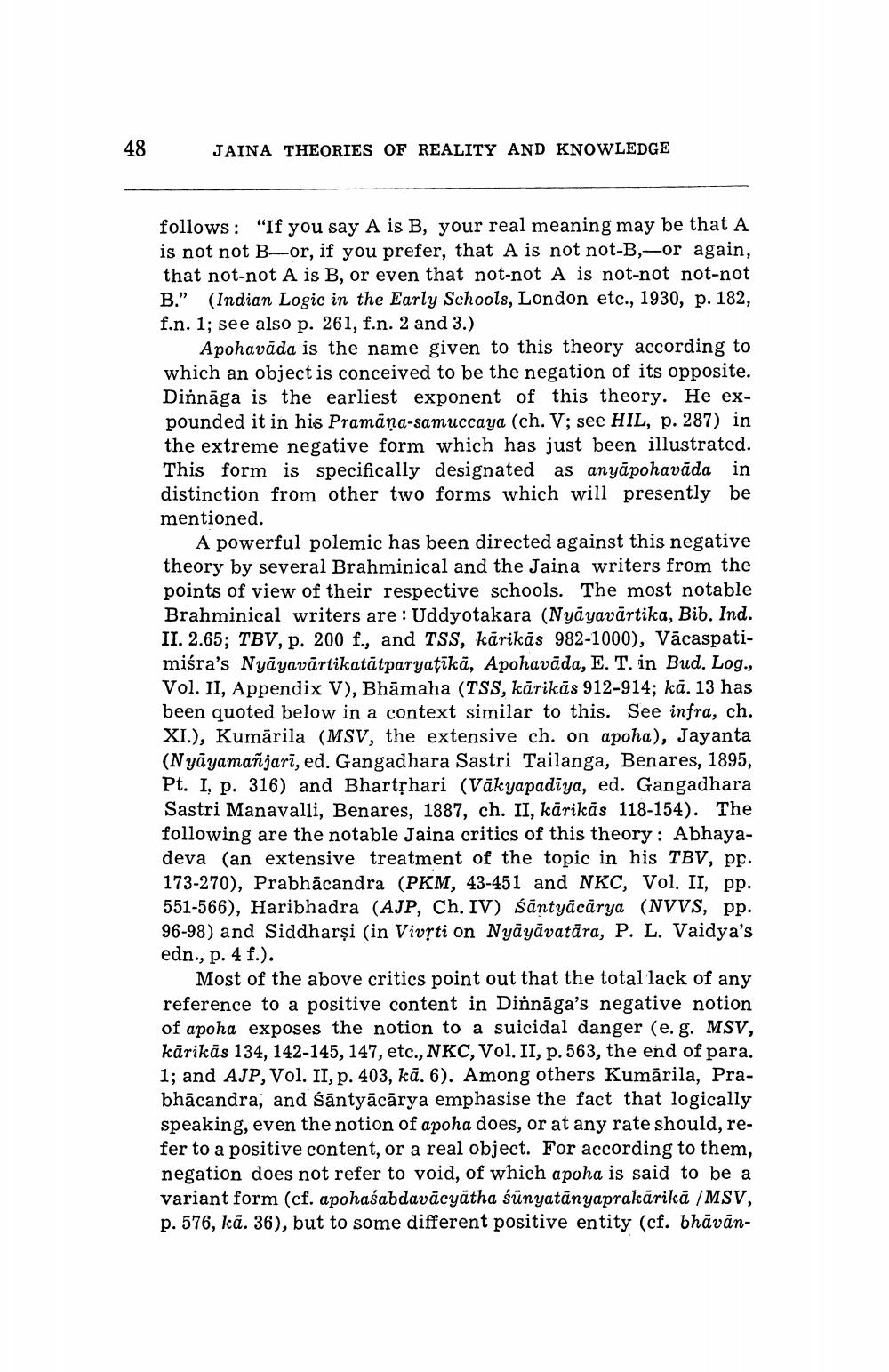________________
48
JAINA THEORIES OF REALITY AND KNOWLEDGE
follows: "If you say A is B, your real meaning may be that A is not not B-or, if you prefer, that A is not not-B,-or again, that not-not A is B, or even that not-not A is not-not not-not B.” (Indian Logic in the Early Schools, London etc., 1930, p. 182, f.n. 1; see also p. 261, f.n. 2 and 3.)
Apohavada is the name given to this theory according to which an object is conceived to be the negation of its opposite. Dinnāga is the earliest exponent of this theory. He expounded it in his Pramāņa-samuccaya (ch. V; see HIL, p. 287) in the extreme negative form which has just been illustrated. This form is specifically designated as anyāpohavāda in distinction from other two forms which will presently be mentioned
A powerful polemic has been directed against this negative theory by several Brahminical and the Jaina writers from the points of view of their respective schools. The most notable Brahminical writers are: Uddyotakara (Nyāyavārtika, Bib. Ind. II. 2.65; TBV, p. 200 f., and TSS, kārikās 982-1000), Vācaspatimiśra's Nyāyavārtikatātparyațīkā, Apohavāda, E. T. in Bud. Log., Vol. II, Appendix V), Bhāmaha (TSS, kārikās 912-914; kā. 13 has been quoted below in a context similar to this. See infra, ch. XI.), Kumārila (MSV, the extensive ch. on apoha), Jayanta (Nyāyamañjarī, ed. Gangadhara Sastri Tailanga, Benares, 1895, Pt. I, p. 316) and Bhartshari (Vākyapadīya, ed. Gangadhara Sastri Manavalli, Benares, 1887, ch. II, kärikās 118-154). The following are the notable Jaina critics of this theory: Abhayadeva (an extensive treatment of the topic in his TBV, pp. 173-270), Prabhācandra (PKM, 43-451 and NKC, Vol. II, pp. 551-566), Haribhadra (AJP, Ch. IV) śāntyācārya (NVVS, pp. 96-98) and Siddharşi (in Vivști on Nyāyāvatāra, P. L. Vaidya's edn., p. 4 f.).
Most of the above critics point out that the total lack of any reference to a positive content in Dinnāga's negative notion of apoha exposes the notion to a suicidal danger (e. g. MSV, kārikās 134, 142-145, 147, etc., NKC, Vol. II, p.563, the end of para. 1; and AJP, Vol. II, p. 403, kā. 6). Among others Kumārila, Prabhācandra, and śāntyācārya emphasise the fact that logically speaking, even the notion of apoha does, or at any rate should, refer to a positive content, or a real object. For according to them, negation does not refer to void, of which apoha is said to be a variant form (cf. apohaśabdavācyātha śünyatānyaprakārikā /MSV, p. 576, kā. 36), but to some different positive entity (cf. bhāvān




